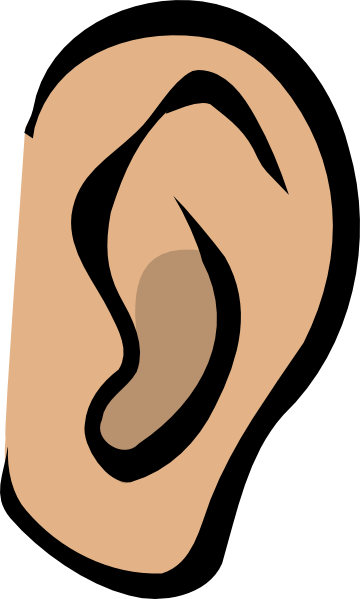
(Humpback whales do not possess vocal cords they make sound by their pushing air out through their nasal cavities.)” The humpbacks inspired many terrestrial performers Judy Collins incorporated some of their calls into her album “Whales and Nightingales” Pete Seeger wrote “Song of the World’s Last Whale” and the New York Philharmonic played “And God Created Great Whales,” a piece composed by Alan Hovhaness. This was a particularly impressive feat, as one commentator noted, for a “work with no musicians, no lyrics, no danceable beats and actually no singers either. The album spent several weeks on the Billboard 200 and sold more than a hundred thousand copies. While the paper was in the works, Payne arranged to have the humpbacks’ songs released as an LP. Each series, he argued, qualified as a “song.”
#LISTENING EARS CLIPART SERIES#
“Humpback whales ( Megaptera novaeangliae) produce a series of beautiful and varied sounds for a period of 7 to 30 minutes and then repeat the same series with considerable precision,” Payne wrote. The paper in which he announced his discovery appeared in Science in the summer of 1971. The humpbacks always made their wails, squeals, and grunts in a particular order-A, B, C, D, E and never A, B, D, C, E, in Payne’s formulation. The exercise took years, but eventually it confirmed what he had suspected. With the help of a machine called a sound spectrograph, Payne converted the voices on the tape into a series of squiggle-like notations.

Finally, it dawned on him that what he was listening to had a structure. Payne found the tape mesmerizing and listened to it hundreds of times. The sounds-made, the engineer had determined, by humpback whales-ranged from mournful wails that evoked the call of a shofar to high-pitched cries that resembled the squeals of piglets. Payne took a copy of the tape home with him. He played a tape of some of them to Payne, who later recalled, “What I heard blew my mind.” While listening for enemy subs, the engineer had chanced upon other undersea sounds. There he met an engineer who had worked for the United States Navy, monitoring Soviet submarines via microphones installed off the coast. At the suggestion of an acquaintance, he made his way to Bermuda. He had been studying moths now he decided to switch his attention to cetaceans.Īside from the dead one, Payne had never actually seen a whale, nor did he know where whales could be observed. Payne stood in the rain for a long time, gazing at the corpse. Someone had hacked off its flukes, and another person, or perhaps the same one, had stuck a cigar butt in its blowhole. Two passersby had carved their initials in its flanks. When he arrived, he discovered that the animal had been mutilated. Although it was a cold, wet March night, he decided to drive to the shore.


One evening almost sixty years ago, a Tufts University researcher named Roger Payne was working in his lab when he heard a radio report about a whale that had washed up on a beach nearby. The diverse outcomes in Germanic assume generalization throughout the paradigm of the original stem variants: most forms from oblique stems *ahuz-, ahiz-, but Old High German ah, from nominative *ahaz and Old Norse ax, Gothic ahs, from a syncopated stem *ah-sa-.This content can also be viewed on the site it originates from. Middle English er, ere, going back to Old English ēar (Northumbrian æhher), going back to Germanic *ahaz (whence also Old Frisian ār "ear of grain," Middle Dutch aer, aere, Old Saxon ehir, Old High German ah, ahar, ehir, Old Norse ax, Gothic ahs), going back to Indo-European *h 2eḱ-es-, s-stem derivative from the base *h 2eḱ- "sharp, pointed" (in reference to a spike of grain perhaps originally referring to the awns, then generalized to the entire spike), whence also Latin acer-, acus "husks of grain or legumes, chaff," Tocharian B āke "end," Tocharian A āk - more at edge entry 1 Middle English ere, from Old English ēare akin to Old High German ōra ear, Latin auris, Greek ous


 0 kommentar(er)
0 kommentar(er)
